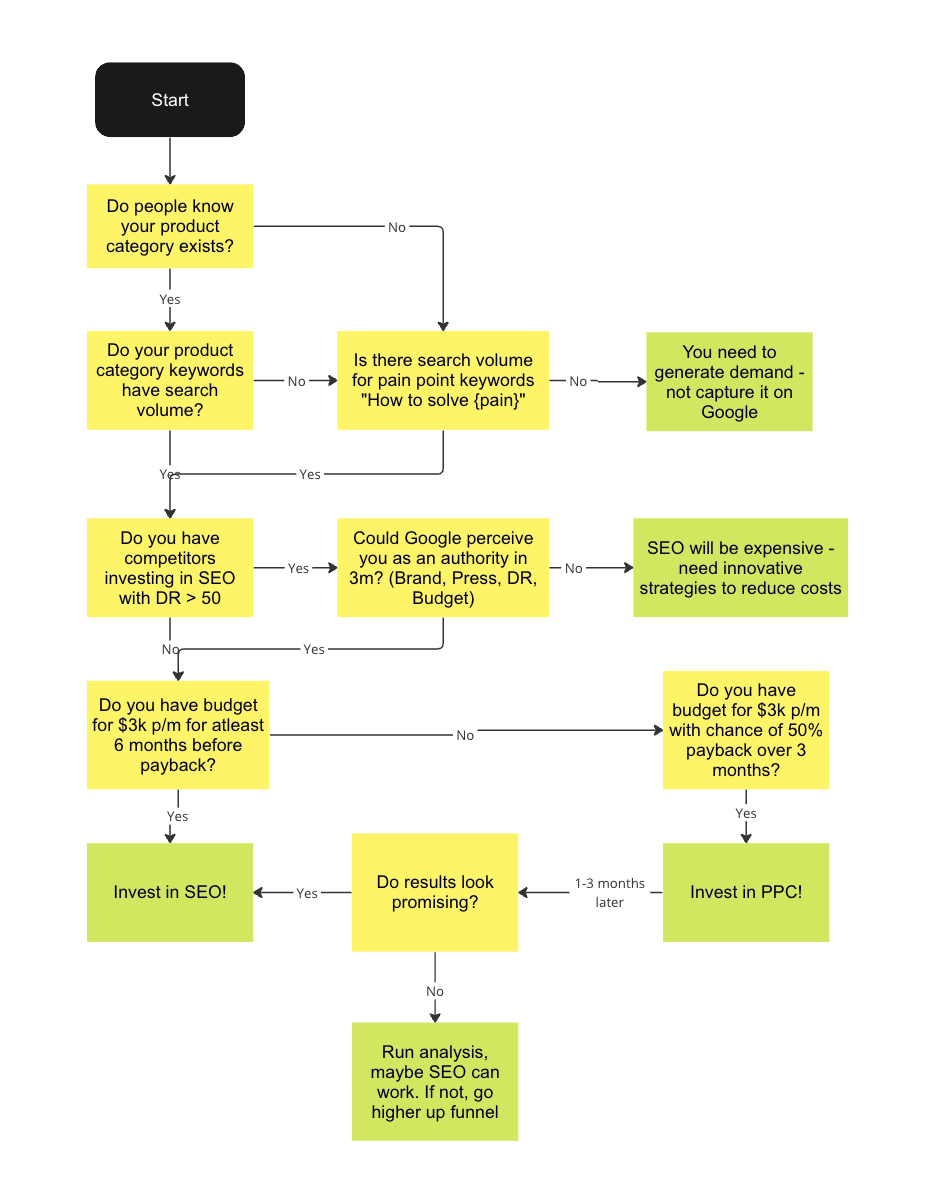Consider this: I was speaking to a B2B SaaS founder. He had already got his first few customers through network, cold outreach and referrals. And he was investigating if SEO was the right channel to bring inbound leads at scale.
Spoiler: We decided it was NOT the right channel.
Surprised? Despite the allure of big promises from SEO agencies ready to lock in hefty contracts, our discussion saved him a significant sum – somewhere between $30k and $50k in what would have been ineffective marketing spend.
So, what led us to this conclusion?
In this article, I’m going to walk you through our discussion and show you the exact framework we used to evaluate if SEO was right for his business and also provide clarity on whether this approach could be an effective strategy for yours.
Don’t make this mistake
As soon as the conversation began, I knew we were off to a wrong start.
I’ve had countless conversations with businesses looking to invest in SEO. Like most of them, this founder immediately wanted to discuss:
- How much should they spend?
- How long will it take to see ‘results’?
- How much content should they create?
- Is their domain authority high enough yet?
These are questions that you absolutely need to ask, but they came way too early in our discussion.
Here’s what I said:
‘Before we delve into those questions, we need to discuss a more fundamental topic:
- Is SEO the right channel for your business?
- Is there a natural fit between your product, the market, and the SEO channel (also referred to as “Product-Market-Channel fit”)?
- Do the characteristics of the SEO channel mean your business would effectively get leads from Google?’
There was a short silence.
These questions are much harder to answer. They delve into deep strategic topics that require both business acumen and profound SEO experience.
A couple more seconds passed.
‘Okay, so how do we work that out?’ he said.
We then followed the framework below, which I later documented and presented in a webinar.
The framework we followed
Here’s the framework — and now, I’ll walk you through it step by step.

By the way – I recorded a video of me walking through this framework. Play it whilst you read through the below:
Category Adoption and Search Volumes
Okay, first and foremost, you need to understand that SEO is a demand capture channel and NOT a demand creation one.
What that means is that when people want what you offer, and they turn to a search engine like Google for it, SEO ensures your site pops up in their results.
It works perfectly well and you’ll find a ton of keywords for products that already have a built-in demand, like consumer electronics, household items, or well-established services like travel booking or online shopping.
But to be honest, if you’ve invented something revolutionary and are selling this one-of-a-kind product online, SEO is not really going to help make people want to buy it.
It really doesn’t matter whether you “rank #1” for a query if no one is looking for it.
So, should you target keywords with zero search volume?
Well, it depends…
You need to do a bit of research with tools like Google Trends and Keyword Planner and ask yourself a few questions:
- Does the keyword reflect clear intent?
- Is it a seasonal keyword?
- Can this keyword add significant value to my content?
- Does it address a pain point?
If all your answers are ‘yes,’ then targeting keywords with zero search volume could still be worth it. But if it’s a ‘no’, then it could be more effective to direct your efforts toward generating demand elsewhere. Learn more about how Webflow and SEO compare, and whether Webflow is the right choice for your SEO strategy
Competition and Authority
Okay, the next step involves knowing who you’re up against.
If you don’t have competitors, you’re the luckiest business out there. But in most cases, that’s not the reality. You’ll still have some indirect competition or industry giants who might overshadow your presence.
Pretend that you are your own customer and are interested in buying something you offer. Now, simply search for that term on Google and study the results.
Do you see a lot of sponsored ads of businesses similar to yours?
Are there companies offering the same service ranking at the top of the page?
If yes, then that’s a sure-shot indicator that you should invest in SEO too.
But there’s one more thing to look out for, which is how far ahead these players are from you in the race. This is important as it will decide how expensive SEO is going to cost you and whether it’s worth playing that game or not.
To this end, tools like Ahrefs are perfect for in-depth spying on competitors. With it, you’ll know if they are generating new blog posts, building backlinks or even creating new pages to appear for certain specific keywords.
Bonus tip: You’ll even get an idea of their estimated traffic value.
Budget and Timing
If everything’s ticking the box so far, it’s time to consider how much you’re willing to shell out.
Good quality SEO services aren’t cheap. It could cost you anywhere between $4k and $15k per month for SEO without content creation.
Also, remember, Rome wasn’t built overnight, and neither is SEO. It can take at least 6 to 12 months to start seeing ROI (return on investment).
But you’ll definitely reap the rewards in the long run.
An old client of mine in the beverage industry is a perfect example: The company scaled from 0 to 44k monthly organic traffic in 7 months. And, as of today, they’ve leapt to a 30 domain rating and secured the #1 spot for the keyword ‘Spirulina Drink.’
But if you don’t have that kind of money right now, it’s better to rent out a position on the first page using Google Ads. The price paid in the long run, however, would be way higher, and you’ll lose your spot once you stop paying. This highlights the ongoing debate of SEO vs Google Ads in terms of cost-effectiveness and sustainability.
Your next step
The wrong thing to do now is save this article and do nothing.
Instead, take action.
Dive into the framework laid out here. You might be able to do this alone – or you can work it through with a co-founder, employee or SEO expert. Have a back and forth discussion – debate the details and the consequences.
Bonus tip: Working through this framework with someone who has substantial SEO experience will make the process a lot easier and the results far more reliable.
You can book a time with our team below to have that conversation.



